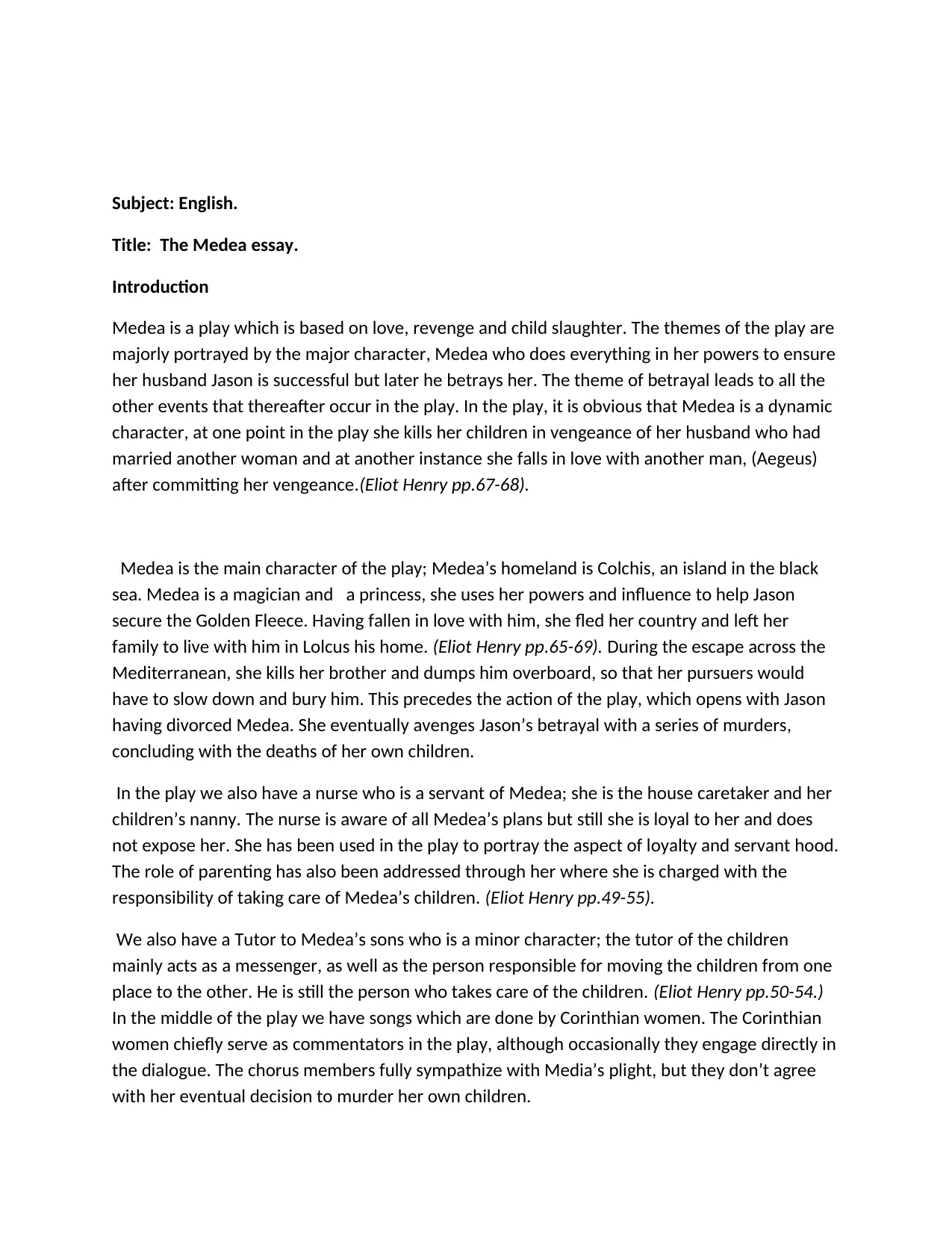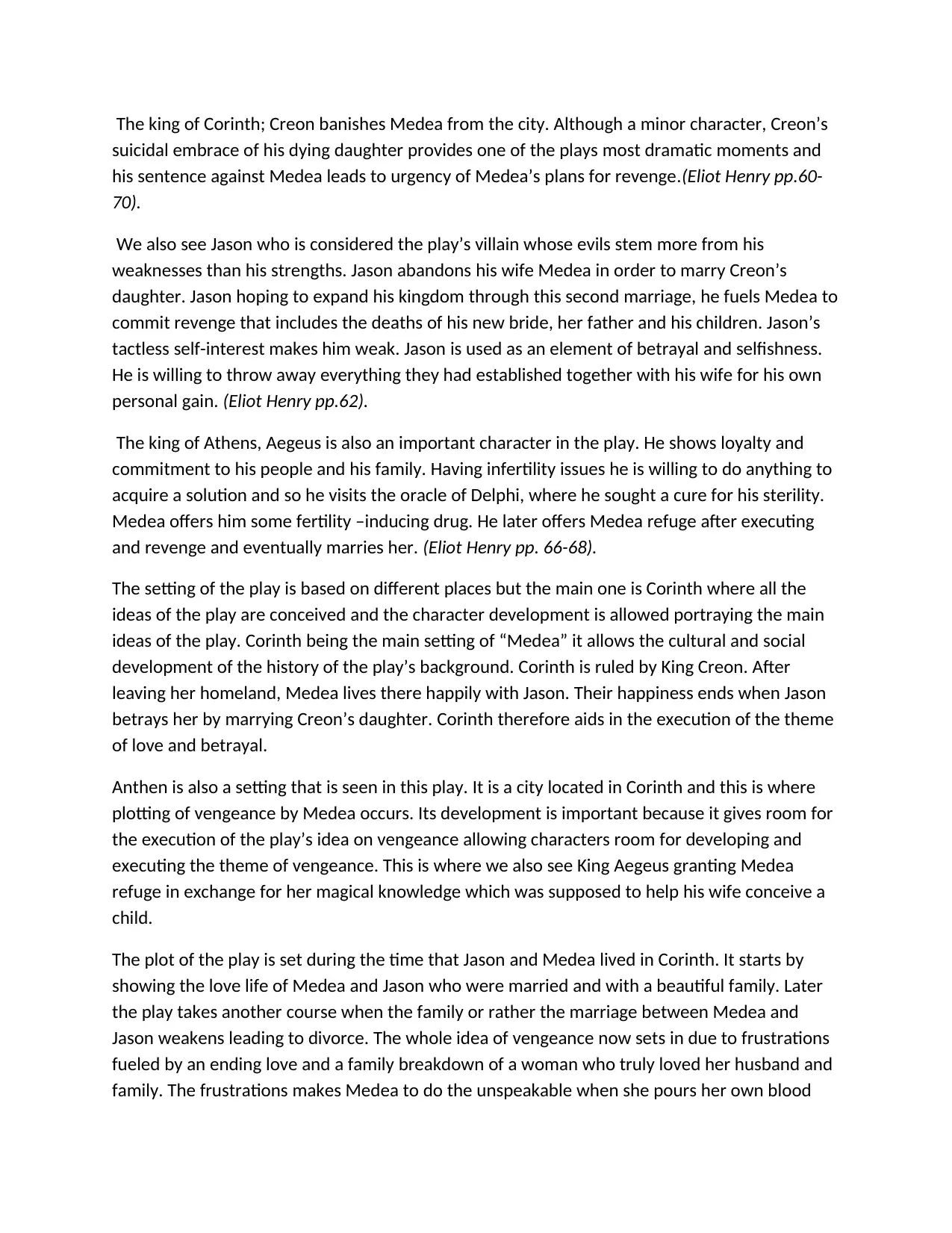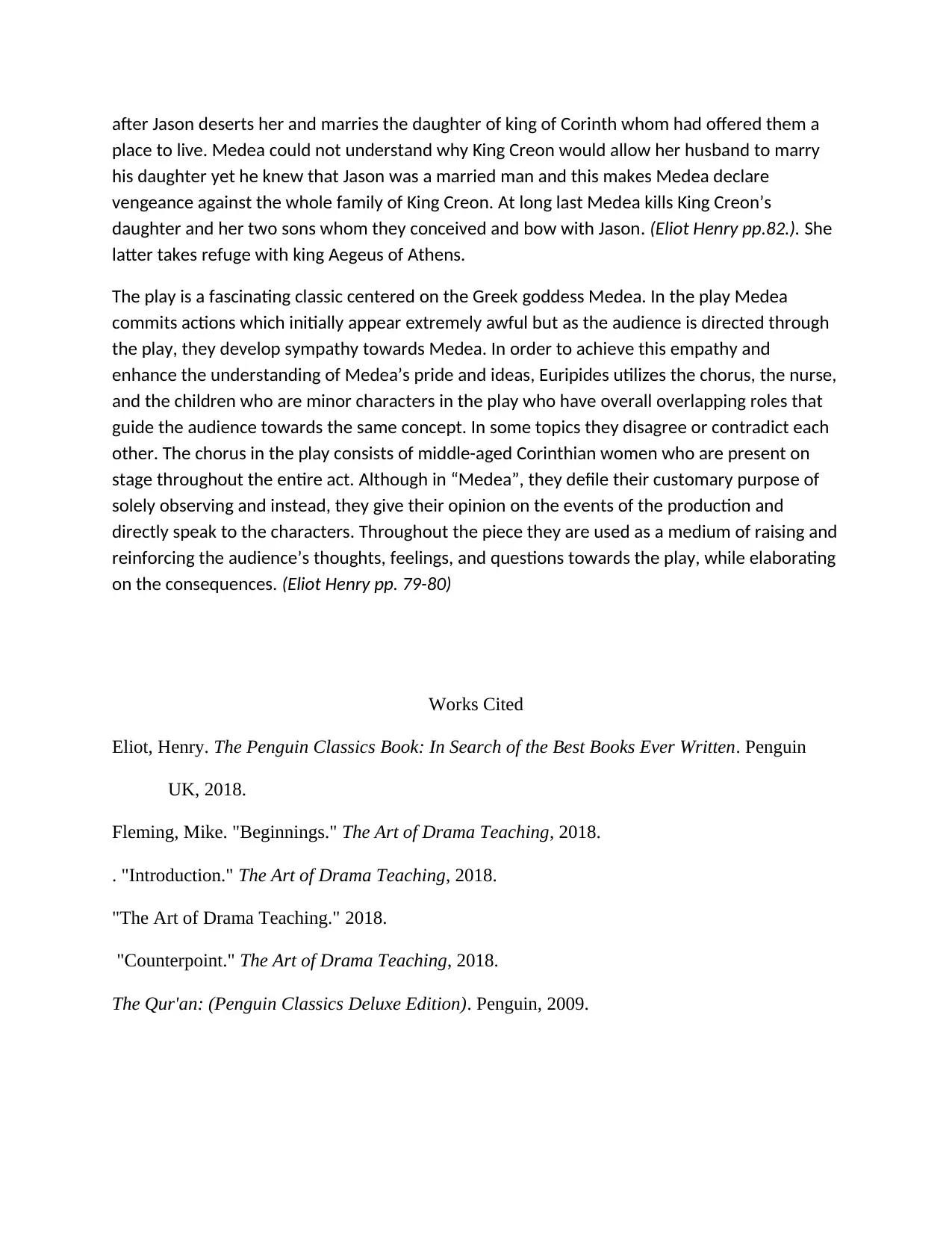English Essay: Exploring the Complexities of Medea
VerifiedAdded on 2023/01/20
|4
|1447
|68
Essay
AI Summary
This essay provides an in-depth analysis of Euripides' play, Medea, focusing on its core themes of love, betrayal, and revenge. The essay delves into the character of Medea, a princess and magician who uses her powers to aid her husband, Jason, but is later betrayed by him. This betrayal fuels her vengeful actions, including the murder of her own children. The essay explores the roles of other key characters such as the Nurse, the Chorus, Creon, and Aegeus, and how they contribute to the play's dramatic tension and thematic development. The settings of Corinth and Athens are examined, highlighting their significance in driving the plot and character development. The essay also discusses the play's plot, from the initial love between Medea and Jason to the tragic climax of Medea's vengeance. By analyzing the characters, themes, and plot, the essay aims to provide a comprehensive understanding of Medea's complexities and its enduring impact as a classic Greek tragedy. The essay also cites various sources to support its arguments and insights.

Subject: English.
Title: The Medea essay.
Introduction
Medea is a play which is based on love, revenge and child slaughter. The themes of the play are
majorly portrayed by the major character, Medea who does everything in her powers to ensure
her husband Jason is successful but later he betrays her. The theme of betrayal leads to all the
other events that thereafter occur in the play. In the play, it is obvious that Medea is a dynamic
character, at one point in the play she kills her children in vengeance of her husband who had
married another woman and at another instance she falls in love with another man, (Aegeus)
after committing her vengeance.(Eliot Henry pp.67-68).
Medea is the main character of the play; Medea’s homeland is Colchis, an island in the black
sea. Medea is a magician and a princess, she uses her powers and influence to help Jason
secure the Golden Fleece. Having fallen in love with him, she fled her country and left her
family to live with him in Lolcus his home. (Eliot Henry pp.65-69). During the escape across the
Mediterranean, she kills her brother and dumps him overboard, so that her pursuers would
have to slow down and bury him. This precedes the action of the play, which opens with Jason
having divorced Medea. She eventually avenges Jason’s betrayal with a series of murders,
concluding with the deaths of her own children.
In the play we also have a nurse who is a servant of Medea; she is the house caretaker and her
children’s nanny. The nurse is aware of all Medea’s plans but still she is loyal to her and does
not expose her. She has been used in the play to portray the aspect of loyalty and servant hood.
The role of parenting has also been addressed through her where she is charged with the
responsibility of taking care of Medea’s children. (Eliot Henry pp.49-55).
We also have a Tutor to Medea’s sons who is a minor character; the tutor of the children
mainly acts as a messenger, as well as the person responsible for moving the children from one
place to the other. He is still the person who takes care of the children. (Eliot Henry pp.50-54.)
In the middle of the play we have songs which are done by Corinthian women. The Corinthian
women chiefly serve as commentators in the play, although occasionally they engage directly in
the dialogue. The chorus members fully sympathize with Media’s plight, but they don’t agree
with her eventual decision to murder her own children.
Title: The Medea essay.
Introduction
Medea is a play which is based on love, revenge and child slaughter. The themes of the play are
majorly portrayed by the major character, Medea who does everything in her powers to ensure
her husband Jason is successful but later he betrays her. The theme of betrayal leads to all the
other events that thereafter occur in the play. In the play, it is obvious that Medea is a dynamic
character, at one point in the play she kills her children in vengeance of her husband who had
married another woman and at another instance she falls in love with another man, (Aegeus)
after committing her vengeance.(Eliot Henry pp.67-68).
Medea is the main character of the play; Medea’s homeland is Colchis, an island in the black
sea. Medea is a magician and a princess, she uses her powers and influence to help Jason
secure the Golden Fleece. Having fallen in love with him, she fled her country and left her
family to live with him in Lolcus his home. (Eliot Henry pp.65-69). During the escape across the
Mediterranean, she kills her brother and dumps him overboard, so that her pursuers would
have to slow down and bury him. This precedes the action of the play, which opens with Jason
having divorced Medea. She eventually avenges Jason’s betrayal with a series of murders,
concluding with the deaths of her own children.
In the play we also have a nurse who is a servant of Medea; she is the house caretaker and her
children’s nanny. The nurse is aware of all Medea’s plans but still she is loyal to her and does
not expose her. She has been used in the play to portray the aspect of loyalty and servant hood.
The role of parenting has also been addressed through her where she is charged with the
responsibility of taking care of Medea’s children. (Eliot Henry pp.49-55).
We also have a Tutor to Medea’s sons who is a minor character; the tutor of the children
mainly acts as a messenger, as well as the person responsible for moving the children from one
place to the other. He is still the person who takes care of the children. (Eliot Henry pp.50-54.)
In the middle of the play we have songs which are done by Corinthian women. The Corinthian
women chiefly serve as commentators in the play, although occasionally they engage directly in
the dialogue. The chorus members fully sympathize with Media’s plight, but they don’t agree
with her eventual decision to murder her own children.
Paraphrase This Document
Need a fresh take? Get an instant paraphrase of this document with our AI Paraphraser

The king of Corinth; Creon banishes Medea from the city. Although a minor character, Creon’s
suicidal embrace of his dying daughter provides one of the plays most dramatic moments and
his sentence against Medea leads to urgency of Medea’s plans for revenge.(Eliot Henry pp.60-
70).
We also see Jason who is considered the play’s villain whose evils stem more from his
weaknesses than his strengths. Jason abandons his wife Medea in order to marry Creon’s
daughter. Jason hoping to expand his kingdom through this second marriage, he fuels Medea to
commit revenge that includes the deaths of his new bride, her father and his children. Jason’s
tactless self-interest makes him weak. Jason is used as an element of betrayal and selfishness.
He is willing to throw away everything they had established together with his wife for his own
personal gain. (Eliot Henry pp.62).
The king of Athens, Aegeus is also an important character in the play. He shows loyalty and
commitment to his people and his family. Having infertility issues he is willing to do anything to
acquire a solution and so he visits the oracle of Delphi, where he sought a cure for his sterility.
Medea offers him some fertility –inducing drug. He later offers Medea refuge after executing
and revenge and eventually marries her. (Eliot Henry pp. 66-68).
The setting of the play is based on different places but the main one is Corinth where all the
ideas of the play are conceived and the character development is allowed portraying the main
ideas of the play. Corinth being the main setting of “Medea” it allows the cultural and social
development of the history of the play’s background. Corinth is ruled by King Creon. After
leaving her homeland, Medea lives there happily with Jason. Their happiness ends when Jason
betrays her by marrying Creon’s daughter. Corinth therefore aids in the execution of the theme
of love and betrayal.
Anthen is also a setting that is seen in this play. It is a city located in Corinth and this is where
plotting of vengeance by Medea occurs. Its development is important because it gives room for
the execution of the play’s idea on vengeance allowing characters room for developing and
executing the theme of vengeance. This is where we also see King Aegeus granting Medea
refuge in exchange for her magical knowledge which was supposed to help his wife conceive a
child.
The plot of the play is set during the time that Jason and Medea lived in Corinth. It starts by
showing the love life of Medea and Jason who were married and with a beautiful family. Later
the play takes another course when the family or rather the marriage between Medea and
Jason weakens leading to divorce. The whole idea of vengeance now sets in due to frustrations
fueled by an ending love and a family breakdown of a woman who truly loved her husband and
family. The frustrations makes Medea to do the unspeakable when she pours her own blood
suicidal embrace of his dying daughter provides one of the plays most dramatic moments and
his sentence against Medea leads to urgency of Medea’s plans for revenge.(Eliot Henry pp.60-
70).
We also see Jason who is considered the play’s villain whose evils stem more from his
weaknesses than his strengths. Jason abandons his wife Medea in order to marry Creon’s
daughter. Jason hoping to expand his kingdom through this second marriage, he fuels Medea to
commit revenge that includes the deaths of his new bride, her father and his children. Jason’s
tactless self-interest makes him weak. Jason is used as an element of betrayal and selfishness.
He is willing to throw away everything they had established together with his wife for his own
personal gain. (Eliot Henry pp.62).
The king of Athens, Aegeus is also an important character in the play. He shows loyalty and
commitment to his people and his family. Having infertility issues he is willing to do anything to
acquire a solution and so he visits the oracle of Delphi, where he sought a cure for his sterility.
Medea offers him some fertility –inducing drug. He later offers Medea refuge after executing
and revenge and eventually marries her. (Eliot Henry pp. 66-68).
The setting of the play is based on different places but the main one is Corinth where all the
ideas of the play are conceived and the character development is allowed portraying the main
ideas of the play. Corinth being the main setting of “Medea” it allows the cultural and social
development of the history of the play’s background. Corinth is ruled by King Creon. After
leaving her homeland, Medea lives there happily with Jason. Their happiness ends when Jason
betrays her by marrying Creon’s daughter. Corinth therefore aids in the execution of the theme
of love and betrayal.
Anthen is also a setting that is seen in this play. It is a city located in Corinth and this is where
plotting of vengeance by Medea occurs. Its development is important because it gives room for
the execution of the play’s idea on vengeance allowing characters room for developing and
executing the theme of vengeance. This is where we also see King Aegeus granting Medea
refuge in exchange for her magical knowledge which was supposed to help his wife conceive a
child.
The plot of the play is set during the time that Jason and Medea lived in Corinth. It starts by
showing the love life of Medea and Jason who were married and with a beautiful family. Later
the play takes another course when the family or rather the marriage between Medea and
Jason weakens leading to divorce. The whole idea of vengeance now sets in due to frustrations
fueled by an ending love and a family breakdown of a woman who truly loved her husband and
family. The frustrations makes Medea to do the unspeakable when she pours her own blood

after Jason deserts her and marries the daughter of king of Corinth whom had offered them a
place to live. Medea could not understand why King Creon would allow her husband to marry
his daughter yet he knew that Jason was a married man and this makes Medea declare
vengeance against the whole family of King Creon. At long last Medea kills King Creon’s
daughter and her two sons whom they conceived and bow with Jason. (Eliot Henry pp.82.). She
latter takes refuge with king Aegeus of Athens.
The play is a fascinating classic centered on the Greek goddess Medea. In the play Medea
commits actions which initially appear extremely awful but as the audience is directed through
the play, they develop sympathy towards Medea. In order to achieve this empathy and
enhance the understanding of Medea’s pride and ideas, Euripides utilizes the chorus, the nurse,
and the children who are minor characters in the play who have overall overlapping roles that
guide the audience towards the same concept. In some topics they disagree or contradict each
other. The chorus in the play consists of middle-aged Corinthian women who are present on
stage throughout the entire act. Although in “Medea”, they defile their customary purpose of
solely observing and instead, they give their opinion on the events of the production and
directly speak to the characters. Throughout the piece they are used as a medium of raising and
reinforcing the audience’s thoughts, feelings, and questions towards the play, while elaborating
on the consequences. (Eliot Henry pp. 79-80)
Works Cited
Eliot, Henry. The Penguin Classics Book: In Search of the Best Books Ever Written. Penguin
UK, 2018.
Fleming, Mike. "Beginnings." The Art of Drama Teaching, 2018.
. "Introduction." The Art of Drama Teaching, 2018.
"The Art of Drama Teaching." 2018.
"Counterpoint." The Art of Drama Teaching, 2018.
The Qur'an: (Penguin Classics Deluxe Edition). Penguin, 2009.
place to live. Medea could not understand why King Creon would allow her husband to marry
his daughter yet he knew that Jason was a married man and this makes Medea declare
vengeance against the whole family of King Creon. At long last Medea kills King Creon’s
daughter and her two sons whom they conceived and bow with Jason. (Eliot Henry pp.82.). She
latter takes refuge with king Aegeus of Athens.
The play is a fascinating classic centered on the Greek goddess Medea. In the play Medea
commits actions which initially appear extremely awful but as the audience is directed through
the play, they develop sympathy towards Medea. In order to achieve this empathy and
enhance the understanding of Medea’s pride and ideas, Euripides utilizes the chorus, the nurse,
and the children who are minor characters in the play who have overall overlapping roles that
guide the audience towards the same concept. In some topics they disagree or contradict each
other. The chorus in the play consists of middle-aged Corinthian women who are present on
stage throughout the entire act. Although in “Medea”, they defile their customary purpose of
solely observing and instead, they give their opinion on the events of the production and
directly speak to the characters. Throughout the piece they are used as a medium of raising and
reinforcing the audience’s thoughts, feelings, and questions towards the play, while elaborating
on the consequences. (Eliot Henry pp. 79-80)
Works Cited
Eliot, Henry. The Penguin Classics Book: In Search of the Best Books Ever Written. Penguin
UK, 2018.
Fleming, Mike. "Beginnings." The Art of Drama Teaching, 2018.
. "Introduction." The Art of Drama Teaching, 2018.
"The Art of Drama Teaching." 2018.
"Counterpoint." The Art of Drama Teaching, 2018.
The Qur'an: (Penguin Classics Deluxe Edition). Penguin, 2009.
⊘ This is a preview!⊘
Do you want full access?
Subscribe today to unlock all pages.

Trusted by 1+ million students worldwide

1 out of 4
Related Documents
Your All-in-One AI-Powered Toolkit for Academic Success.
+13062052269
info@desklib.com
Available 24*7 on WhatsApp / Email
![[object Object]](/_next/static/media/star-bottom.7253800d.svg)
Unlock your academic potential
Copyright © 2020–2026 A2Z Services. All Rights Reserved. Developed and managed by ZUCOL.





